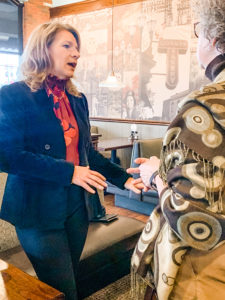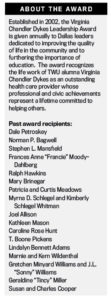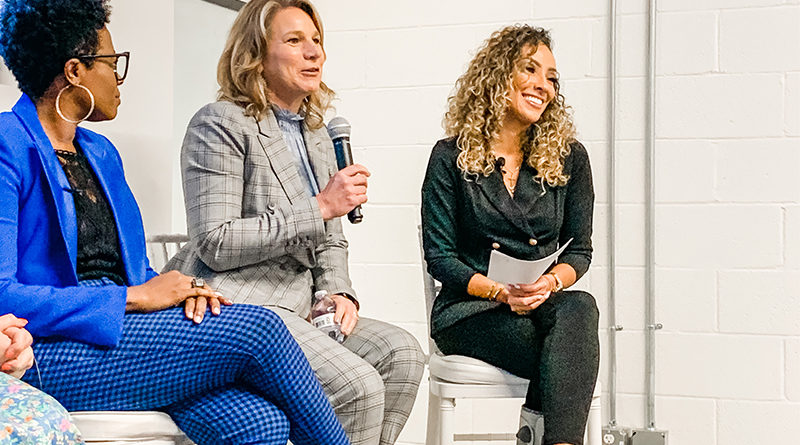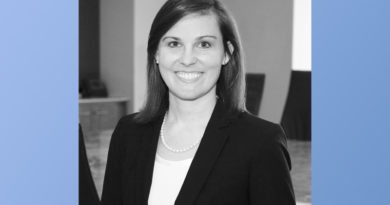‘You Step Up, And You Serve’
The tornado sirens stopped, the winds calmed, and Dallas city council member Jennifer Staubach Gates took to the mode of transportation that would quickly get her to the damaged areas of her district the night of Oct. 20.
“I rode my bike into the neighborhood,” she said. “I just had to cross Royal, and I was just blocks away.”
As she pedaled down Lennox Lane, the amount of destruction became clear.
“I realized – obviously, I didn’t know it was an EF 3 at this point – that the damage to the area was incredible,” she said. “And I was just in that immediate neighborhood.”
“What better opportunity to represent a community that I love and care for, and in a city that I think has meant so much to my family.” -Jennifer Staubach Gates

Gates took her bike back home that night and headed downtown, but she said it became her preferred way to get around the area when trying to visit and check on constituents the first couple of weeks after the storm.
Gates’ brand of public service was forged by a bit of a trial by fire in her first term. Not long after she took office, Dallas was the epicenter of international news when Thomas Eric Duncan became the first Ebola patient diagnosed in the U.S.
Duncan had been visiting family who lived in Gates’ district.
The fact that her council career will likely be bookended by catastrophes hasn’t escaped Gates.
“I started, and there was probably an expectation and naivete on my part on what it was going to be like to represent District 13 at City Hall,” she said. “And, ironically, Ebola was in my first term, and I got thrown into that without a playbook. What is the role of a public servant during an Ebola crisis?”
From that crisis, Gates said she learned that she could be an effective advocate for the people in her district. “You step up, and you serve,” she said. “And you create your own playbook. And I found my niche.”

Gates has been named the recipient of the 18th annual Virginia Chandler Dykes Leadership Award, presented by Bank of Texas, Texas Woman’s University, and the Texas Woman’s University Foundation.
She will be honored at a luncheon on Feb. 20.
“Jennifer’s leadership in the community, her ongoing commitment to address issues critical to improving the lives of others, and her passion for the value of education make her an ideal recipient of this award,” said Texas Woman’s Chancellor Carine M. Feyten. “Jennifer is someone who demonstrates a servant’s heart not only through her work as a councilmember but also in her daily life.”
Gates said she was “honored” to be considered. But as she finishes up her final 18 months or so as a councilwoman, don’t expect Gates to slow down.
“Who knows what to expect in the next 18 months,” she said. “But I was driven to run out of public service, and what better opportunity to represent a community that I love and care for, and in a city that I think has meant so much to my family.”
An extended conversation with Gates follows. It has been edited for clarity and length.
PN: So first things first – how does it feel to get an award that so many important North Texans have been given? What was your reaction?
JGS: I’m very honored that that was even considered. To be put on the same list with the previous winners — that’s a big compliment.
PN: Can we talk about the tornado? I know our readers are probably interested in your recollection. I know it seemed like there was probably two solid weeks where anyone involved with it just really didn’t stop.
JGS: That’s how I felt. I felt like more initially, definitely the first week I felt like I didn’t stop, sleep or eat or drink. And not that I was participating at a level like our first responders or the crews that were doing the work. But it was just being in this response, in this communication mode and hearing from the people, what was not working, what they needed help with, and then trying to communicate with those that could provide the services.
And now there’s the recovery mode, and we’ve moved on to how to rebuild. And in my office, really, I feel like we still get daily phone calls or emails that are connected to the tornado. And it still occupies a lot of my time, be it related to the rebuilding of the shopping centers or the community wanting input on Dallas ISD and how it’s going to use the land at TJ and Cary and Walnut Hill.
My life now has moved from pre tornado and post-October 20, and I feel my work time has been drastically changed. And I anticipate for the really the rest of my term, it’s going to be it’s a priority to make sure that we don’t have missed opportunities on rebuilding and restoring the lives of those that are affected.
PN: What are some of the biggest frustrations right now?
JSG: It’s gonna be a little frustrating to have to wait, because it seems like we’re kind of in a wait-and-see mode for a lot of stuff because we’re waiting on the federal government to decide whether they agree with us on the evaluations and everything else on how much this actually cost the city. And the school district is in the same boat because some of their money is tied to that federal money as well.
I think we’re all gonna have – and when I say we I mean, the city as well as the school district – are going to have out-of-pocket costs that are going to exceed what we are insured for.
We’re still you know, we have FEMA, and the way they that their criteria, it’s uninsured property. And in most of our property, we’re insured – both at the DISD and the city. Now, things like our street signals or not, but we might have reimbursement through TxDOT that I think are going to be eligible for, so that would not be considered out of pocket. So if we get reimbursed for that, then it won’t count towards our FEMA.
But what’s interesting is that it’s not just out of pocket expense, it’s what you’re not insured for. So the fire station itself – 41 – was insured, but how we build the fire stations currently the replacement of it is different, so it’s going to cost us more. And there’s no reason to replace what is existing because they were built for different apparatuses. And we when we build fire stations now, we build them with the idea that our city is growing.
PN: So that first couple of weeks after the tornado, like most of us who live in Preston Hollow, or adjacent, the commute was rough – I think I had a two-and-a-half-hour commute home one night. How did you handle that?
JSG: That week, I really did not leave the district. I didn’t go north of the tornado until I came down to City Hall on Wednesday. And you’re right, I think I ended up driving Royal all the way to 35, and it took me 35 minutes to do that. So it took me about an hour to get downtown because there was traffic on 35, and it’s a way I’ve never ever gone to work before.
But it was more effective for me – and I think Mr. Kleinman was the same way – to stay in my district. I mean I rode my bike into the tornado aftermath. After the tornado, I just had to cross Royal, because I was blocks away. So I rode down Strait and cut across to Lennox and got to friends I had that lived in that area just to kind of really get an idea of what had happened.
I realized – obviously, I didn’t know it was an EF 3 at this point – that the damage to the area was incredible. And I was just in that immediate neighborhood.
I rode my bike back home and got in, the city manager said, “you should come down, we’ve opened the Office of Emergency Management.” So I got in my car, and I could get downtown that night pretty easily actually, and then I got home about 3 o’clock.
We drove around the next morning, but after that, it was easier for me to bike around. I went into the Lobello, Ursula, and Netherland area on bike, because Inwood was closed down. I could bike down Inwood and get in, and then I could bike across Meadors and cross the tollway there and get over towards the Preston Royal area.
It was easier for me to stay here and since my assistants were at the office, I could call them and tell them what residents were telling me.
PN: It seems like the Monday morning right after the tornado was the easiest time, ironically, to get around Preston Hollow.
JSG: Yeah, it was – that first Monday, I went in behind Flower Child, where the post office is because I could come off Northaven and Jamestown and that’s where I parked. I was with (Robert) Wilonsky, actually. And I was like, we can come in this way. We all knew we knew – those of us that live in the area – how to get in and out. And we just walked into Preston and Royal and you could walk all around and see that, you know, these huge air conditioning units that were just on the ground.
And then within the traffic actually got worse there. I think at first people were good about not getting into the zones and then they were like, “We’re going.”
PN: I think we put more barricades up after that, too. And that meant that most of the major thoroughfares that could get you north or south were closed – you basically had 35, 75, and the tollway.
JSG: Yeah, you’re right. We did.
PN: This is your final term. What drives you to want to do this? Because it’s not necessarily it’s not a well-paid job.
JSG: Well, you know, I know I’m at the end of my time, and who knows what’s ahead in the next 18 months. But this is my last term. I’ve served for four terms. And I don’t want to jinx myself, who knows what is ahead in the next 18 months. But I started, and there was probably an expectation and naivete on my part on what it was going to be like to represent District 13 at City Hall.
But I was driven to run out of public service, and what better opportunity to represent a community that I love and care for, and in a city that I think has meant so much to my family? Going from growing up here to having an opportunity to be a parent in Dallas, I learned this lesson early that you give back and you give back, as you’re called.
You know, my mom taught me that, “Don’t step on your own child to help somebody else’s.” So you give back at the time and to the best of your abilities. And I did a lot of giving back in that education while my kids were in school or in health care as a nurse, and with special needs programs.
When this opportunity was presented, I had the time and I think the skills and the love and the knowledge of our city to be able to serve – although I still was questioning that – but that was what drove me. I’m going to give back. It’s a two-year commitment. I’ll run, see if I win. And if I win, I’ll serve. And if I like it, I could run again. I’m committing to two years.
And, ironically, Ebola was in my first term, and I got thrown into that without a playbook. What is the role of a public servant during an Ebola crisis? To be able to stand up for the Vickery Meadow neighborhood and figure out what they needed – from legal assistance to issues where there was discrimination at the workplace because they weren’t letting them work because they’re from that neighborhood. I was instrumental in getting Louise (Duncan’s fiance) moved from that apartment to the Catholic Center, and then we worked with the mayor.
So I worked through that first. But I found my niche. This is what your community needs. You step up and you serve. And then you create your own playbook.
Those first two years I attended everything I got invited to so I understood what everybody’s concerns and needs were. And then my middle next two terms, I really enjoyed the opportunity to represent the community, and what I learned about city services, how to communicate, make a difference, and work with staff to enhance the quality of life in my district and then also participate in collaborate with the mayor and my colleagues on making Dallas a better place for everybody.
And, you know, now this is kind of ironic in the sense that the tornado reminds me a lot of the crisis of the Ebola, which is early in my term, and because in between I’ve dealt with the Atmos gas explosion issues, and I’ve dealt with poor streets and lots of contentious zoning cases. I’ve filled the middle two terms with lots of activity, and I thought maybe my last term would be quieter, but that turned out not to be the case.
But you feel like you make a difference in people’s everyday lives, whether it’s that Sanitation didn’t pick their trash up, or helping them recover from a tornado or standing up for them during Ebola or whatever it might be.
And then I’m also part of a long term study in our city for long term growth and in dealing with issues like crime. I mean, how can we be a safer city and how can we absorb the kind of growth that’s happening in this region? And strategies on homelessness or strategies on economic development are kind of lasting legacies – and we lay the groundwork.
Look at the Northaven Trail, I got to open it when I was a council member but started with Ann Margolin’s work to get the first seed money for that. But, you know, there’s groundwork that I’m laying right now that somebody else is gonna get to cut the ribbon for and to be part of that is very moving. And, you know, selfishly, I feel like I get an opportunity to make a difference.
PN: Tornado aside, what are some of the biggest challenges you see for District 13?
JSG: Continuing to take care of the plan for the future growth that’s going to be impactful, to deal with the deferred infrastructure – meaning our streets and our roads, and then public safety is still a big, big challenge.
I mean, we have we’ve seen violent crime, not necessarily in District 13 at the level it is in other areas of the city, but property crime and any crime in your neighborhood is concerning. And we as a city need to address it better. So I think that is going to continue to be a focus.







